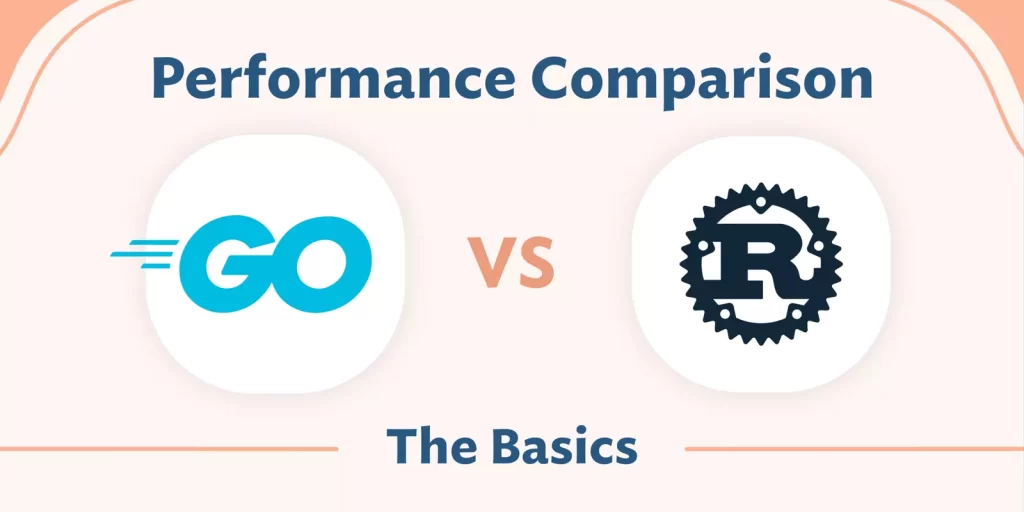➤ How to Code a Game
➤ Array Programs in Java
➤ Java Inline Thread Creation
➤ Java Custom Exception
➤ Hibernate vs JDBC
➤ Object Relational Mapping
➤ Check Oracle DB Size
➤ Check Oracle DB Version
➤ Generation of Computers
➤ XML Pros & Cons
➤ Git Analytics & Its Uses
➤ Top Skills for Cloud Professional
➤ How to Hire Best Candidates
➤ Scrum Master Roles & Work
➤ CyberSecurity in Python
➤ Protect from Cyber-Attack
➤ Solve App Development Challenges
➤ Top Chrome Extensions for Twitch Users
➤ Mistakes That Can Ruin Your Test Metric Program
Go vs Rust Performance Comparison | There are major differences between Rust and Go. Go is well known for focusing more on building web APIs. On the other hand, Rust usually builds web APIs, but from the point of view of a developer, things are much harder using this programming language. Besides focusing on Rust vs Go, we’ll also look into the similarities between these languages below.
Go vs Rust lang – Definitions
Go lang is a programming language that is open-source, and it is compiled and statistically typed. Go language was initially developed by Ken Thompson, Robert Griesemer, and Rob Pike at Google, and it was introduced in 2007 and officially launched in 2009. The programing language usually supports concurrency, thus providing a high chance of building parallel systems successfully. Some of the firms using the Go language include Twitch, Google, and Uber, among others.
Rust is a programming language that is open source that offers safe concurrency. The programming language was developed at Mozilla research by Graydon, and it was unveiled in 2010. Since the programming language lacks concurrency, it is less popular when it comes to developing parallel systems. Some companies currently using the Rust language include Mozilla, Sentry, and Dropbox.
The Rust Use Cases
Rust is suitable for processing CPU-intensive operations, including executing algorithms or applications that require high performance and large volumes of data. The run-time performance of Rust is predictable and consistent even when you’re creating complex abstractions.
Programmers have complete control of the underlying hardware when using Rust, which means it is possible to optimize the Rust programs such that they can be closer to the maximum theoretical performance of the machine. It makes Rust a suitable choice when the execution speed outweighs other considerations.
Additionally, the ability of Rust to deliver in terms of performance ensures a developer cannot introduce certain things to a program that would keep them from compiling. If you’re used to languages such as Ruby or Python, Rust may appear restrictive, and you may feel the need to re-architect the whole program; however, if reliability and correctness are your priority, Rust is worth it.

The pros include:-
- Faster compared to languages such as C/C++.
- Inbuilt dependency helps in building management known as Cargo.
- A multi-purpose language that also bears excellent communities.
The cons include:-
- Cannot develop codes faster than programming languages such as python and ruby.
- Lacks efficient garbage collection.
- Developers may take longer to learn because of the complexities revolving around the language.
Go Use Cases
Go use cases are broad, and the programming language offers high performance and security. The language was mainly designed specifically for development speed instead of execution speed. The Go compiler never spends a lot of time generating efficient machine code. Instead, it focuses on compiling a lot of code fast, providing a suitable environment for distributed systems and software development at scale.
The pros include:-
- Easy to read and very concise.
- A programming language that’s statistically typed and provides simplicity when coding.
- Has a rich standard library.
- Incredibly fast compared to programming languages such as Java and Python
The cons include:-
- It’s not a system language (It cannot be used to create programs that usually control hardware)
- A general-purpose language.
- Lacks the UI tool kit despite having a library section that’s vibrant.
- Lacks support of generics.
Similarities Between Go & Rust
Go and Rust programming languages have numerous similarities, which is the main reason why they’re usually mentioned together in many instances. Let’s look into the similarities now.

1. Memory Safety
Rust and Go are modern programming languages whose main priority is memory safety. With older programming languages such as C++ and C, security vulnerabilities and bugs exist because of accessing memory incorrectly or unsafely. Go and Rust has managed to deal with this issue in different ways. They both aim to be safer and smarter compared to other languages regarding managing memory and helping developers write performant and correct programs.
2. Compact and Fast Executables
Rust and Go are compiled languages, which means the programs have been translated directly to machine code that is executable such that you can deploy a program in the form of a single binary file, unlike when you’re using other languages such as Ruby and Python. With Rust and Go, there is no need to use lots of libraries and an interpreter along with the program, and that’s quite advantageous. It also makes these programming languages fast compared to the interpreted languages.
3. General-purpose Languages
Go, and Rust are scalable and powerful general-purpose programming languages that you can use when developing all types of software, including web applications, mobile apps, and distributed microservices. Each of these languages has standard libraries that are excellent, and there is a third-party ecosystem that’s also thriving. Also, the user base is large, and there is access to great commercial support.
4. Development Scale
Go, and Rust has numerous useful features that make each suitable for programming large codebases and coding among large teams.
5. Pragmatic Programming Style
Rust and Go have features associated with object-oriented and functional programming; these languages are pragmatic, and their main aim is to solve problems in the most appropriate manner possible instead of forcing you to handle things in a particular manner.
Rust vs Go performance
Performance is a prized possession for both Rust and Go. Since these languages are new, they need to perform well compared to the other languages that came before them.
Although these languages seem faster compared to other languages with a similar feature set, the main focus is on how these languages perform against each other. Some benchmark tests have been carried out, and it has been found that Rust is faster compared to Go in different aspects. If you were wondering why is Rust so popular right now, it is because of its ability to outperform Golang.
For those wondering why switching Go to Rust is a viable idea, it’s because of the performance factor.
Conclusion on Go vs Rust
The competition between Rust and Go is stiff since each of these languages has some shortcomings and positive factors. Based on the programmer’s interest and ability to provide flexibility and be fast, Golang has the upper hand. When choosing which programming language to use, the main focus should be on the development objectives and needs of a business.
